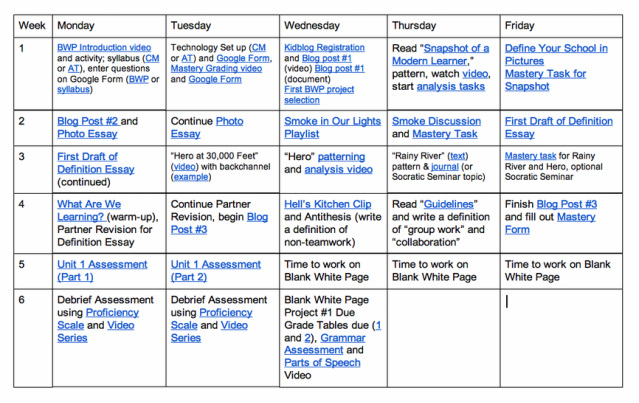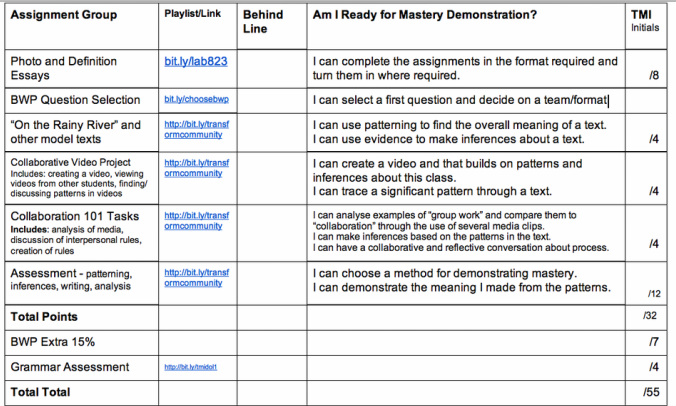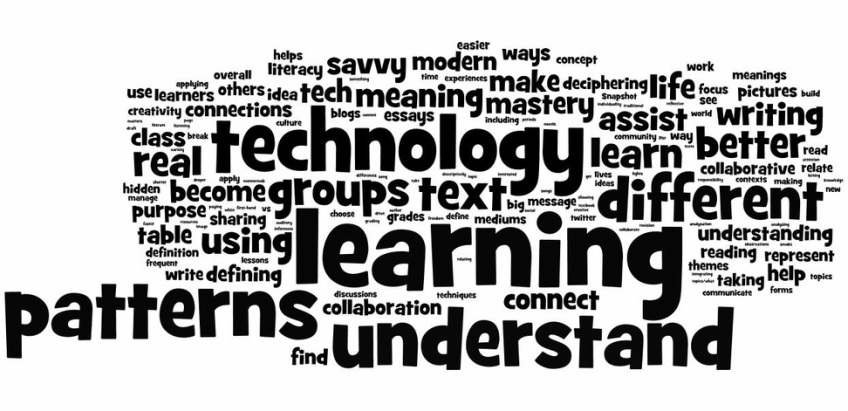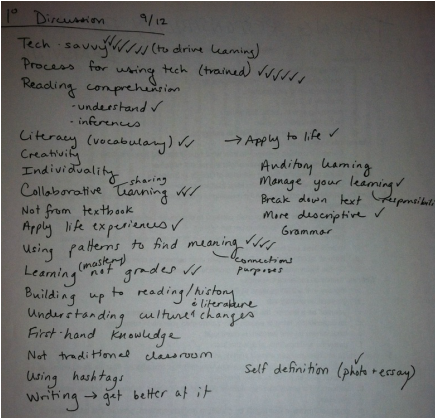In fact, I'm still not convinced it's an amazing idea.
But this week, I handed gave the reins to my 6th period class....for content, instruction and assessment.
I realise that I may be completely insane.
It started with some collaborative brainstorming on topics, questions, methods, and texts they wanted to study. Then each student chose a group and topic and started planning their own content to teach their peers.
I didn't even constrain it to humourous topics. But they are so invested in the course themes that the topics they chose were nearly all comedic; they ranged from writing original comedy, stand-comedy techniques, political satire, musical comedy, and improvisation workshops. Half the class will be producing comedy films and then having the class analyse it closely.
Here were the requirements:
1. Choose a topic/question to cover and choose a group
2. Research and/or create the content/text to be shared
3. Prepare to lead a class discussion (in any format that we've used or practiced)
4. Give students a writing assignment of some kind (in any format)
5. Assess learning
6. Reflect on the effectiveness of their lesson
These units start next Friday. I can't call them presentations. A presentation means a bad powerpoint, nervous students, lack of engagement. These already have a hell of a lot of passion behind them.
Today I couldn't get the computer lab, so I just said:
This class period is yours. If you need something from me, I'll be here. But you guys are in charge.
I expected an argument, or at least a wasted period. But here's what happened:
They all looked at each other, silently. Then,
Cipriana: Let's watch Workaholics! It's an hour before Thanksgiving break.
Alexander: No, that's not the best use of our time right now. We need group time to work some stuff out.
Pierre: Wait guys, can we go around and say what we're going to be covering so there's no repeats? Okay, Chelsea, what are you guys doing, and who is in your group?
They then went around - while the rest of the room was silent - and talked about their concept. After every group gave their idea, other students expressed how excited they were for the ideas. There was not one group that didn't get a "wow, that sounds cool!" at some point. The two groups that were a little similar had a quick negotiation to figure out how close their proposals were. Then they checked in with me about it.
There was one undecided group - they came up and talked to me about their ideas, and with VERY little prompting from me, they came up with a great (slightly scary) question: When it comes to humour about race, where is the line, and why is that the line?
We talked about how to frame it so it would make the best possible discussion. And they left really excited.
**
I gave them the keys to the car, then I got in the backseat. And instead of crashing into a pole, they immediately navigated hairpin turns with dexterity.
I do think they'll run into issues at some point, and will struggle to present their lesson effectively. But they'll figure it out. All of us need to make mistakes to learn how to be better.
**
And here's the meta part...or maybe just the uncomfortable part of all of this.
This week has been overshadowed by a friend of mine being attacked for something she wrote on her blog. In an entry devoted to asking for help to deal with a frustrating issue common to all of us who teach in a public school - unmotivated students - she was attacked with more logical fallacies than the cable news networks had during the election coverage.
The issue? Her statement that her students don't know how to learn math.
They don't. And I think the person most capable of making that judgement - their math teacher - is the one who should make that assessment. Not some strangers on the internet.
Students DO, however, know how to learn in general, but learning academically and learning in general are different. We are always learning. But not everything we try to teach our students is something to which they will connect and in which they are interested.
There are lots of things that I didn't find interesting, but that I'm glad someone pushed me to learn at some point. Here are a few of those things:
- How to solve for variables in Algebra
- Techniques for creating different effects in painting
- French vocabulary
- Word derivations/roots/etymology
- Names and locations of every country (and its capital) in the world
- Hundreds of Bible verses
- Medieval literature and how to analyse the sources that compose a text
- How to actively listen
- How to take notes and make note cards for an essay/presentation
And you know what? I still know how to do those things. Even though I wasn't passionate about any of them, because I had the academic ability to learn, I had the skills needed to transfer that knowledge into my memory.
I also have a freakish ability to find something interesting in ANYTHING I study. My friends in college were absolutely shocked when I gave them the advice I used: Find an angle that is interesting and use that for your essay topics. They looked at me like I was smoking crack.
That's when I realised that what I do naturally is not what everyone does naturally.
Learning is innate. But academic learning? That's acquired. Some of us are lucky to have acquired it young. I did. And I am the exception, not the rule.
We don't go to school to learn how to love playing or eating or sleeping. Those are things we all can find passion for or joy in. We go to school to learn how to learn things we wouldn't normally choose to learn.
And we do that because there are some things that are valuable enough to ask everyone to learn them. That's why the Common Core Standards movement is so important - it cannonises the knowledge we as a culture think is essential for all students to learn.
So what happens when the school system is broken?
You get students who are in 10th grade and have acquired the ability to learn in an academic context. Students who may master video games, but struggle to write a coherent sentence. And some people would say use the video game to teach sentence structure, or just don't teach the sentence structure and hope they'll just "get it" over time.
But is that really serving my students well to not teach sentence structure - at least holistically? Is it a good use of my face-to-face time with my students to use video games to teach sentence structure? Why would I spend time having them learn something with me that they could do on their own? Why would I not give them individualised instruction that meets them where they are and them pushes them forward? And I think that doing that kind of instruction well - where you infuse passion into subjects that aren't natural pairings - is time-consuming and rarely effective. It just ends up being a little condescending to try and squeeze the names of Pokemon characters into paragraphs that have students practice sentence revision.
I also come from a pretty unique background. I was homeschooled for 7 years, spanning the late 80's and early 90's, which was the Unit Study era in homeschooling. We did one on the Pilgrims. I remember planting a garden, making corn cakes, and creating a replica of the Mayflower.
And that's it. I didn't take out of that unit any more knowledge about gardening, cooking, or history than I brought into it. And I fell years behind in math because math "never fit" with the unit studies, and I wasn't motivated to learn it on my own. That is one of my biggest regrets.
Am I saying that it's impossible to do that kind of curriculum well?
Obviously not. The project my students have started would indicate otherwise. I believe that student-driven content can be very powerful.
But there are reasons that my project will be successful. And a lot of it has to do with what we've already learned (not all of which they found interesting), and a lot has to do with what they brought into the course from previous learning.
This will be successful because my students:
- can research information and find reliable sources
- synthesise and analyse information with depth and clarity
- use technology to compile, organise and present information effectively
- have academic conversations that they run without my help
- can stay on task and focused on the end product
- KNOW HOW TO LEARN
Now, because I have kids at the top of their educational game who are highly skilled and motivated, this wouldn't work with every class. And it wouldn't even work in some of my other classes. They don't have the skills they need. And some of them don't want to build those skills. They want the grade. They want to just "get it over with" so they can move on.
So it makes me uncomfortable to, on one hand, turn over a class to a group of students capable of making it a success, and also to acknowledge that they are pretty unique. For the past eight years, I've worked in schools where this never would have worked. And yes, I tried. And it's always been a massive failure.
This is what I think:
Passion + low skills = low effort and/or low quality
Passion + low skills + motivation = variable results (see: Freedom Writers Effect)
Passion + skill + motivation = high effort and high quality
The harsh reality of the state of public education is that not all students come to us prepared or motivated. Can we help those students? Absolutely. That is what my friend wanted: help figuring out how. And instead of help, she was bullied, harassed, and attacked. So she is taking her passion and skill and hiding it so she can avoid being attacked further.
One of the meta-lessons of this issue is that passion doesn't make up for a total deficit of skill. The people attacking her have no lack of passion. But they also don't seem to understand how to have a respectful dialogue, nor engage in a discussion of the issues and avoid going after her personally.
I sincerely hope that, eventually, everyone will be taught the skills they need to be able to pursue their passion. And I hope that eventually, every person could be like the students in my 6th period: skilled, motivated, self-directed, responsible, and extremely passionate.
If the world was filled with people like that, it would be a pretty amazing place to live. It's certainly a pretty amazing place to learn.






 RSS Feed
RSS Feed
